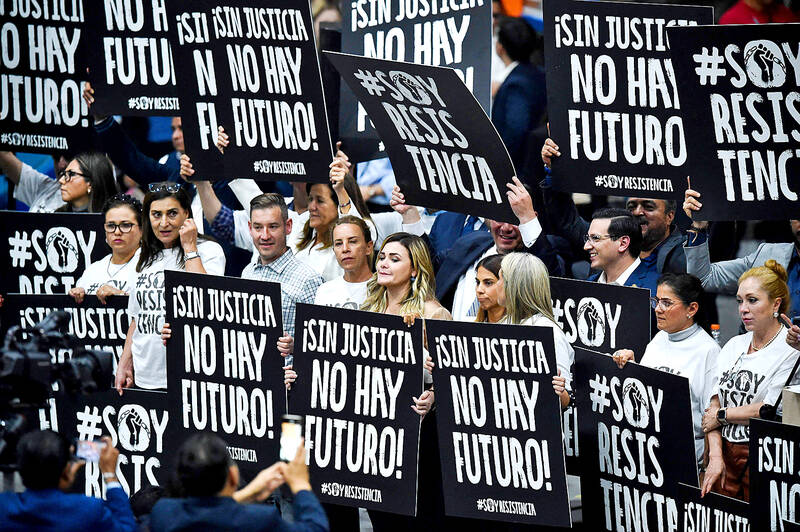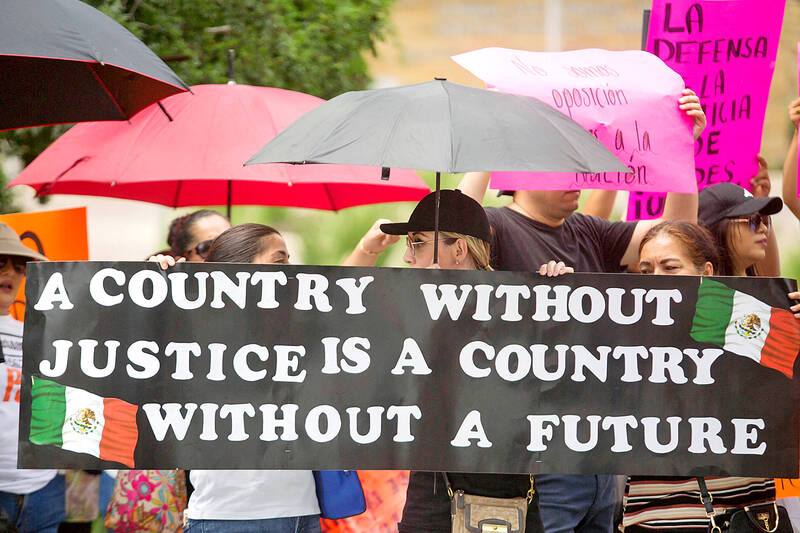After protesters blocked the entrance to Mexico’s Congress on Tuesday in an attempt to stop a judicial overhaul, lawmakers took the first steps to jam through the proposal at a nearby gymnasium.
The plan would make judges stand for election, something critics say would deal a severe blow to the independence of the judiciary, and the system of checks and balances.
The overhaul has fueled a wave of protests by judges, court employees and students across Mexico in the past few weeks, and reached another inflection point on Tuesday when protesters strung ropes across entrances to the lower house of Congress to block legislators from entering.

Photo: AFP
That came as the Mexican Supreme Court voted 8-3 to join strikes, adding more weight to the protests.
“The party with the majority could take control of the judicial branch, and that would practically be the end of democracy,” said protester Javier Reyes, a 37-year-old federal court worker. “They want to own Mexico.”
Despite that, lawmakers from Mexico’s governing party, Morena, and their allies appeared determined to quickly pass the reform. Unable to meet at the congressional building, they instead gathered in a sweltering gymnasium about 5km away to begin the voting process.

Photo: AFP
The party’s strong majority in a recently inaugurated Congress is paving the way for the reform to sail through the process with relative ease.
The proposal was met by hours of fierce debate on Tuesday night after workers laid out grapes, juices and other snacks in a congressional session reminiscent of a summer camp. As Morena politicians said they were building a justice system that would be an example globally, opposition lawmakers from the National Action Party (PAN) railed on the governing party.
“We should inaugurate a wall of shame that says: ‘Today begins the fall of our Republic.’ And it should have the date and all the faces of the Morena congressmen,” shouted Paulina Rubio Fernandez, a PAN congresswoman, surrounded by other members of her party.
Rubio Fernandez accused the president and his party of “lying” to get a majority in Congress, while another colleague in her party warned that Morena was “shooting itself in the foot” by passing the reform.
Outside, protesters roared, blocking streets and demanding lawmakers hear their objections to the proposal.
The reforms submitted by Mexican President Andres Manuel Lopez Obrador and Morena have drawn criticism domestically, and from foreign governments and investors. Lopez Obrador, who has long been at odds with the judiciary and other independent regulatory agencies, says that the proposal is necessary to fight corruption.
Critics say the overhaul would stack the courts in favor of Lopez Obrador’s party, politicize the judicial system and pose a threat to foreign investment.
Under the current system, judges and court secretaries, who act as judges’ assistants, slowly qualify for higher positions based on their record. Under the proposed changes, any lawyer with minimal qualifications could run.
The Morena party has the two-thirds majority in Congress needed to approve the reforms, which they should be able to do handily in the lower house of Congress.
The party’s congressional leader, Mexican Representative Ricardo Monreal, said there were no plans to abandon the reforms, adding: “This reform is going ahead.”

Kehinde Sanni spends his days smoothing out dents and repainting scratched bumpers in a modest autobody shop in Lagos. He has never left Nigeria, yet he speaks glowingly of Burkina Faso military leader Ibrahim Traore. “Nigeria needs someone like Ibrahim Traore of Burkina Faso. He is doing well for his country,” Sanni said. His admiration is shaped by a steady stream of viral videos, memes and social media posts — many misleading or outright false — portraying Traore as a fearless reformer who defied Western powers and reclaimed his country’s dignity. The Burkinabe strongman swept into power following a coup in September 2022

‘FRAGMENTING’: British politics have for a long time been dominated by the Labor Party and the Tories, but polls suggest that Reform now poses a significant challenge Hard-right upstarts Reform UK snatched a parliamentary seat from British Prime Minister Keir Starmer’s Labor Party yesterday in local elections that dealt a blow to the UK’s two establishment parties. Reform, led by anti-immigrant firebrand Nigel Farage, won the by-election in Runcorn and Helsby in northwest England by just six votes, as it picked up gains in other localities, including one mayoralty. The group’s strong showing continues momentum it built up at last year’s general election and appears to confirm a trend that the UK is entering an era of multi-party politics. “For the movement, for the party it’s a very, very big

ENTERTAINMENT: Rio officials have a history of organizing massive concerts on Copacabana Beach, with Madonna’s show drawing about 1.6 million fans last year Lady Gaga on Saturday night gave a free concert in front of 2 million fans who poured onto Copacabana Beach in Rio de Janeiro for the biggest show of her career. “Tonight, we’re making history... Thank you for making history with me,” Lady Gaga told a screaming crowd. The Mother Monster, as she is known, started the show at about 10:10pm local time with her 2011 song Bloody Mary. Cries of joy rose from the tightly packed fans who sang and danced shoulder-to-shoulder on the vast stretch of sand. Concert organizers said 2.1 million people attended the show. Lady Gaga

SUPPORT: The Australian prime minister promised to back Kyiv against Russia’s invasion, saying: ‘That’s my government’s position. It was yesterday. It still is’ Left-leaning Australian Prime Minister Anthony Albanese yesterday basked in his landslide election win, promising a “disciplined, orderly” government to confront cost-of-living pain and tariff turmoil. People clapped as the 62-year-old and his fiancee, Jodie Haydon, who visited his old inner Sydney haunt, Cafe Italia, surrounded by a crowd of jostling photographers and journalists. Albanese’s Labor Party is on course to win at least 83 seats in the 150-member parliament, partial results showed. Opposition leader Peter Dutton’s conservative Liberal-National coalition had just 38 seats, and other parties 12. Another 17 seats were still in doubt. “We will be a disciplined, orderly